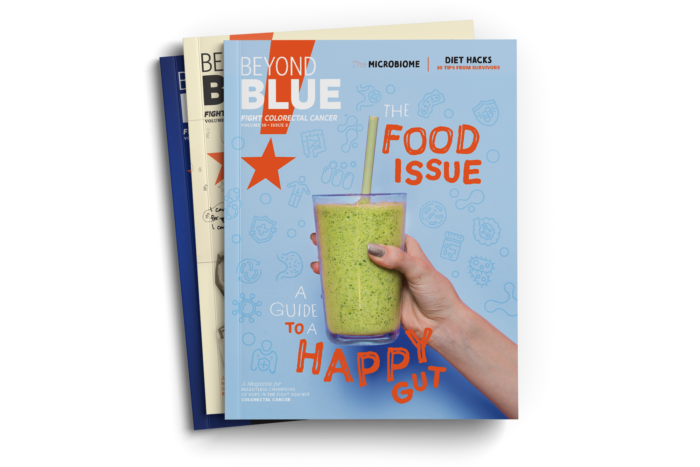Can I Continue Benefiber Before Surgery
What the Fiber?!


Connie Rizzo, MEd, RD, LD, is a registered and licensed dietitian who works full time at the Mercy O'Reilly Cancer Center. She received her bachelor's degree in dietetics from Kansas State University and a master's degree in education from Drury University. She has served in various local, state, and national dietetic offices, and published and presented innovative nutrition research and education. In addition to her work at Mercy, Connie has taught numerous classes, in-person and online at Missouri State University and the University of Phoenix. Connie enjoys blending healthful food with great taste. She explored fresh ideas by completing a professional chef course in world flavors and cultures at The Culinary Institute of America® in Napa Valley, California.
Lots of people have a love/hate relationship with fiber. Too little fiber, and we have poop that's too hard. Too much fiber, and we have poop that's too soft, or maybe too watery, and that's not good either. We are seeking the perfect poop: Not too hard. Not too soft. Just right. It sounds like a fairytale.
Fight Colorectal Cancer (Fight CRC) spoke with Connie Rizzo, MEd, RD, LD, Medical Nutrition Therapist at Mercy Hospital, Cancer Resource Center, C.H. "Chub" O'Reilly Cancer Center of Springfield, Mo., to find out all about fiber.
Q: Not all fiber is created equal: Can you talk about the different types of fiber, and what they do, particularly when related to colon and rectal cancer treatment and surgery?
A: Fiber-containing foods are a mixture of soluble and insoluble fiber. Both types of fiber can aid in digestion and elimination. However, soluble fibers are soluble (dissolve) in water and can bring water into the digestive tract. The soluble fibers allow for slower movement through the digestive tract while reducing constipation and adding some bulk to the stool. On the other hand, insoluble fibers are insoluble in water, not digested, and travel more quickly through the digestive tract. These actions of fiber-containing foods occur before, during, and after colorectal treatment and surgery.
Q: How do we know which vegetables have soluble fiber vs. insoluble fiber? Is one fiber "better" than the other for people who are being treated for colon and rectal cancer or post-surgery?
A: The fiber found in vegetables, fruits, and grains are a combination of both types of fibers. For example, oats, barley, and dried beans (like black and pinto beans) contain soluble fiber; wheat bran, fruit and vegetable skins, and whole-grain breads contain insoluble fiber.
Q: We read all the time about how fiber can prevent colorectal cancer: But what is the value of fiber once someone is being treated for colorectal cancer? What is the value of fiber post-surgery for colon or rectal surgery?
A: The value is two-fold. First, the digestive tract contains a layer of muscle and fiber-containing foods keep the digestive tract fit and the individual healthier. Second, altering the types and amounts of fiber after colorectal surgery or treatment can allow an individual to adjust for challenges with either constipation or diarrhea. If the individual requires an ostomy, the individual will need to adjust the type and amount of fiber to assist with thickening the stool.
Q: Should the daily amount of fiber-containing foods for a person going through treatment or post-surgery be the same as someone before surgery?
A: This often depends on the side effects from the cancer treatment. Immediately after surgery, an individual may need to reduce the total amount of fiber and then slowly add fiber-containing foods to regulate any diarrhea, constipation, or consistency of the stool.
The goal after surgery or treatment is to work up to a healthy, well-tolerated amount of fiber, which can be similar to a person's need for fiber before surgery.
Q: Why should the daily amount of fiber for a person going through treatment or post-surgery be the same as someone before surgery?
A: There is value to fiber-containing foods, including vitamins, minerals, and numerous phytochemicals. Phytochemicals are a wide variety of compounds produced by plants; phytochemicals provide the flavor, aroma, and color to various fruits, vegetables, whole grains, and other plant foods. For example, the red pigment in a tomato or watermelon is the phytochemical called lycopene; allium plants like garlic, onion, and shallots produce compounds (phytochemicals) that contribute to their aroma and taste. Consuming a variety of plant foods containing these phytochemicals may assist in reducing risk and recurrence of cancer, as well as reducing risk of heart disease, diabetes, and high blood pressure.
Q: Will a person who has had colon or rectal surgery still process fiber through food the way they did before treatment or surgery? Or does colon and rectal surgery affect how people process fiber?
A: A low-fiber diet for the first six to eight weeks after ileostomy creation or a low anterior resection surgery may be recommended; however, it is important to transition to a well-balanced diet when you are able. A colostomy patient needs to consume adequate fiber and fluid to avoid constipation after surgery and to reduce diarrhea and/or thicken the stool.
Q: What happens if someone gets too much fiber, particularly during treatment or after surgery for colon or rectal cancer?
A: Someone may experience diarrhea because the food is moving too quickly for the colon (large intestine) to complete its job of absorbing some of the water in the food. Also, absorption of nutrients can decrease if food is moving too rapidly through the digestive tract, and an individual can experience bloating, gas, cramping, and a decrease in appetite with too much fiber consumption.
Q: What happens if someone doesn't get enough fiber, particularly during treatment or after surgery for colon or rectal canceR?
A: If an individual does not consume enough fiber during treatment or surgery, the individual may have constipation and will lack the health benefits of fiber in the diet.
Q: Can fiber from foods affect people during colon and rectal cancer treatment or post-surgery differently than fiber from other sources? For example, what do you think about using Metamucil as a form of fiber?
A: Whole foods with fiber are preferred because they contain a variety of vitamins, minerals, and phytochemicals (plant chemicals) that help your body remain healthy. Adding and regulating fiber in the diet is always the first choice. Some people may require a fiber supplement like Metamucil when it is difficult to manage the consistency of the stool with diet alone. Many fiber supplements are only soluble or insoluble fiber.
Benefiber is wheat dextrin, and FiberCon is calcium polycarbophil, and both are mainly soluble fiber. Citrucel is methylcellulose, which is mainly insoluble fibers that is nonfermentable. Metamucil contains psyllium, which is mainly soluble fiber, but also some insoluble fiber. The type of fibers (whether they are soluble or insoluble) in these supplements affect the digestive tract in much the same way as the soluble and insoluble fiber in foods.
If a fiber supplement is necessary, the individual should begin with a low dose and gradually increase the amount of fiber. It is important to ask your physician or dietitian how much fiber to add because too much fiber may decrease absorption of valuable nutrients. Fiber supplements can decrease the absorption of some other medications so I recommend the individual take other medications one hour before or two hours after consuming the fiber supplement to minimize the interaction.
Q: Why is fiber important for patients who have undergone colorectal cancer surgery?
A: Fiber is important for good health by keeping the digestive system working well, providing phytochemicals, and lowering the inflammation in the digestive tract (inflammation can lead to cancer and other disease).
Q: What are side effects of eating fiber?
A: Side effects from consuming fiber include gas, bloating, and cramping if fiber is increased too quickly.
Q: How do we counter these side effects?
A: It is best to increase fiber foods gradually so the body can adjust to it.
Q: If both soluble and insoluble fibers' roles are to slow down digestion and create bulk, why is it that too much fiber can cause diarrhea?"
A: If too much insoluble fiber is consumed, the individual may have diarrhea because the food is moving too fast for the colon to absorb adequate water. Even though soluble fiber can slow the digestive tract and is often fermented in the colon, fiber-containing food is a combination of both soluble and insoluble fibers so too much of any fiber foods could cause diarrhea.
Q: Can you pass along your experiences on foods that work well with patients who have had colorectal surgery? Colon surgery?
A: Everyone is different, and each individual will have varying experiences. Sometimes a person will find that although a food that worked one day, the same food can be a challenge another day. It is important to remember that anxiety can stimulate the muscular layer of the digestive tract to move faster and create problems. Patience is necessary to explore how these fiber foods will affect each individual's digestive tract.
Q: How about for rectal surgery?
A: When rectal surgery includes an ostomy, the individual may need to alter the fiber to make the stool thicker. It is important to ask your dietitian or physician for recommendations.
Q: Do you have any tips for people going through treatment for colon and rectal cancer or for survivors?
A: Colon and rectal cancer survivors should eat a diet with a variety of fruits, vegetables, whole grains, legumes, beans, and nuts, along with less red meat and processed foods. No more than 12 to 18 oz. of cooked red meat a week is recommended (red meat includes any beef, pork, or lamb). In addition, cancer survivors can benefit from regular exercise to maintain a healthy weight, and moderate or no alcohol consumption. Post-surgery, it can be very difficult to return to a level of healthy eating. Food may not sit well with you. You might get frustrated and discouraged with feeling constipated or struggle with diarrhea. Don't give up. Take your time and work your way up to it.
Q: Do you have a "go to" list of fiber foods?
A: I encourage people to try a variety of whole, plant-containing foods to get fiber in their diet. Fruits, vegetables, beans and legumes, whole grains and cereals all contain fiber and offer beneficial phytochemicals. The specific foods need to be adjusted for the individual.
Q: Do you have a "go to" list of fiber supplements?
A: The type of fiber supplement (soluble, insoluble, or both) would depend on the individual's difficulty. If a supplement is necessary after altering fiber-containing foods, I suggest a fiber-containing supplement based on the individual's challenges with the digestive tract and stools. One essential reminder is to drink adequate water when adding any fiber supplements or fiber-containing foods for them to work properly.
It can be tricky and exceptionally frustrating trying to figure out your perfect balance of fiber, but keeping a food journal with what you eat, symptoms, successes, and how you were feeling emotionally while you were eating can be extremely helpful in determining what foods may work best for you.

Get the latest issue of Beyond Blue!
Food. We can't live without it, but for many in the colorectal cancer community, it's hard to live with it. Yet as doctors, nutritionists, and research data all say: Diet and nutrition play an essential role in cancer prevention and treatment. Food is a topic we can't ignore.
This website uses cookies to improve your experience. We'll assume you're ok with this, but you can opt-out if you wish. Cookie settingsACCEPT
lampungmeiuaromme1969.blogspot.com
Source: https://fightcolorectalcancer.org/blog/what-the-fiber/